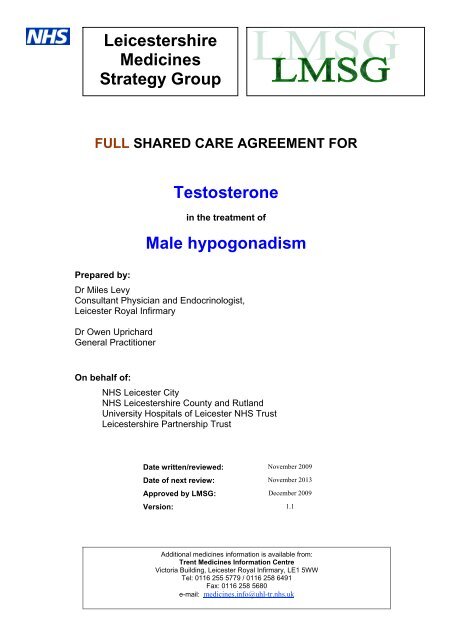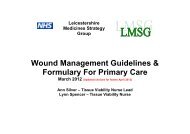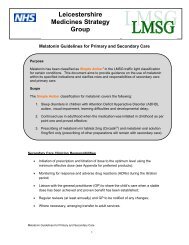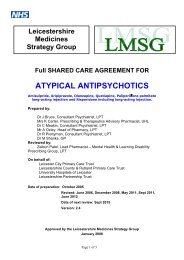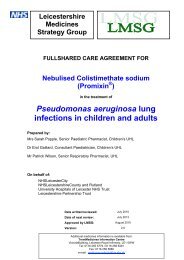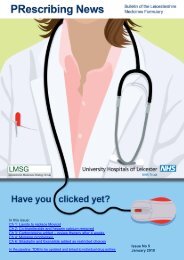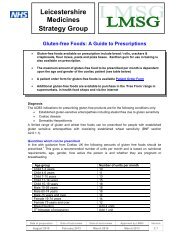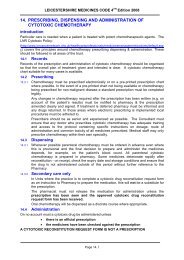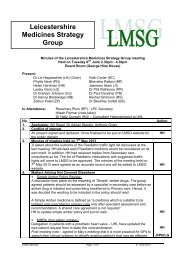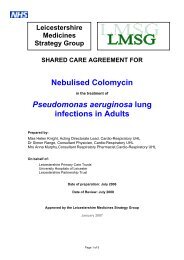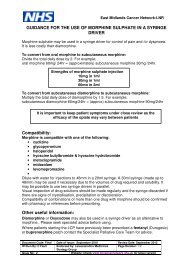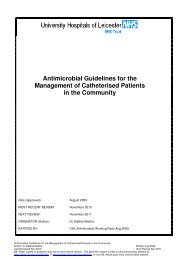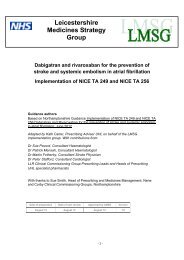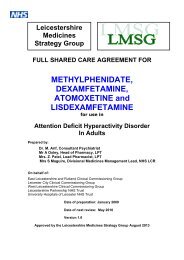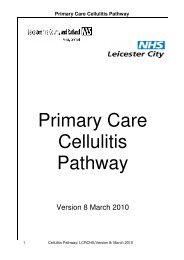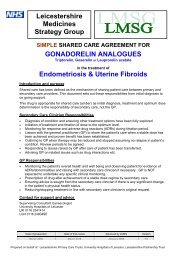Testosterone for male hypogonadism - Leicestershire Medicines ...
Testosterone for male hypogonadism - Leicestershire Medicines ...
Testosterone for male hypogonadism - Leicestershire Medicines ...
Create successful ePaper yourself
Turn your PDF publications into a flip-book with our unique Google optimized e-Paper software.
<strong>Leicestershire</strong><strong>Medicines</strong>Strategy GroupFULL SHARED CARE AGREEMENT FOR<strong>Testosterone</strong>in the treatment ofMale <strong>hypogonadism</strong>Prepared by:Dr Miles LevyConsultant Physician and Endocrinologist,Leicester Royal InfirmaryDr Owen UprichardGeneral PractitionerOn behalf of:NHS Leicester CityNHS <strong>Leicestershire</strong> County and RutlandUniversity Hospitals of Leicester NHS Trust<strong>Leicestershire</strong> Partnership TrustDate written/reviewed: November 2009Date of next review: November 2013Approved by LMSG: December 2009Version: 1.1Additional medicines in<strong>for</strong>mation is available from:Trent <strong>Medicines</strong> In<strong>for</strong>mation CentreVictoria Building, Leicester Royal Infirmary, LE1 5WWTel: 0116 255 5779 / 0116 258 6491Fax: 0116 258 5680e-mail: medicines.info@uhl-tr.nhs.uk
Full Shared Care Policy <strong>for</strong> the prescribing of testosterone in the treatment of<strong>male</strong> <strong>hypogonadism</strong>Introduction and purposeThis shared care agreement has been produced following classification of testosteronereplacement in the <strong>Leicestershire</strong> drug traffic light scheme. See websitewww.lmsg.nhs.ukShared care has been defined as the mechanism of sharing patient care betweenprimary and secondary care providers. This document sets out these responsibilitiesfrom initial diagnosis to on going support.Disease BackgroundHypogonadism is defined as testosterone deficiency with associated symptoms or signs,deficiency of spermatozoa production, or both. It may result from a disorder of the testes(primary <strong>hypogonadism</strong>) or of the hypothalamic-pituitary axis (secondary<strong>hypogonadism</strong>). Both may be congenital or acquired as the result of aging, disease,drugs, or other factors. Additionally, a number of congenital enzyme deficiencies causevarying degrees of target organ androgen resistance. Diagnosis is confirmed byhormone levels. Treatment varies with aetiology but typically includes testosteronereplacement.Drug covered by the agreement<strong>Testosterone</strong> replacement therapy is given <strong>for</strong> androgen deficiency and may beprovided as a 3-4 weekly injection, as a gel or as a 3 monthly injection. Oral therapyand testosterone implants are used only occasionallySecondary Care Clinician Responsibilities• Diagnosis of condition (including differential diagnosis) and ensuring other treatmentoptions have been fully explored• Discussion and education of the patient to agree a suitable choice of product fromthe preparations available 1• Baseline measurement of testosterone level, FBC, LFT and PSA (in men > 50 yearswith their consent after explanation) and communicating results to the GP.• Initiation of treatment and monitoring <strong>for</strong> response and adverse drug reactions(ADRs) during titration period• Measurement of testosterone levels at a suitable timescale after initiation dependenton preparation prescribed.Liaison with the general practitioner (GP) to share the patient’s care when a stabledose has been achieved and proven benefit has been established using the SharedCare Agreement Form.• Outlining to GP when therapy may be reduced and stopped assuming no relapse inpatient’s condition. Review periods to be agreed.• Responding to issues raised by GP after care of patient has been transferred• Advising GP on related issues such as drug interactions etc.GP Responsibilities• Monitoring the patient’s overall health and well being and observing patient <strong>for</strong>evidence of ADRs/abnormalities and liaising with secondary care clinician ifnecessary.• Prescription of drug after achievement of a stable dose regime by secondary care.
• Ensuring advice is sought from the secondary care clinician if there is any significantchange in the patient’s physical health status that may affect prescribing orappropriateness of the drug• Reducing/stopping treatment in line with secondary care clinician’s original request• Annual monitoring of FBC, LFT and PSA and seeking specialist opinion on action totake if appropriate.Contact <strong>for</strong> support and adviceDr Miles Levy or Dr Trevor HowlettConsultant EndocrinologistLeicester Royal Infirmary0116 258 5157Supporting In<strong>for</strong>mation1 Options are:• <strong>Testosterone</strong> gels (Tostran ® , Testogel ® and Testim ® ). Testim ® is not stocked by UHLpharmacies but is available <strong>for</strong> prescribing in primary care.<strong>Testosterone</strong> mixed esters, 3-4 weekly injection• <strong>Testosterone</strong> undecanoate 250mg/ml (Nebido ® ), 3 monthly injection• <strong>Testosterone</strong> undecanoate oral (Restandol ® Testocaps). Used only occasionally <strong>for</strong>patients unable to tolerate gels or intramuscular injections• <strong>Testosterone</strong> implant. Use has largely been superseded by the availability of 3monthly intramuscular depot injections.Summary of Product Characteristics (SPC) Testogel ® , Testim ® , Tostran ® (<strong>Testosterone</strong>gels); Sustanon® 250mg (mixed testorone esters consisting of testosterone propionate30mg, testosterone phenylpropionate 60mg, testosterone isocaproate 60mg,testosterone decanoate 100mg/ml); Nebido® (<strong>Testosterone</strong> undecanoate, 3 monthly);Restandol ® (Oral testosterone undecanoate); <strong>Testosterone</strong> implants. Available from e-MC at http://emc.medicines.org.uk/Reference to SCA <strong>for</strong>m added June 2011


